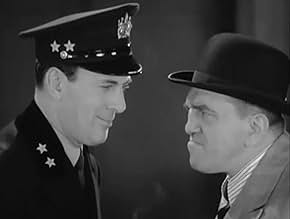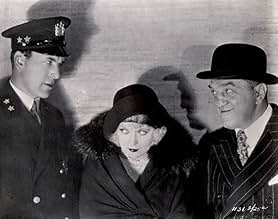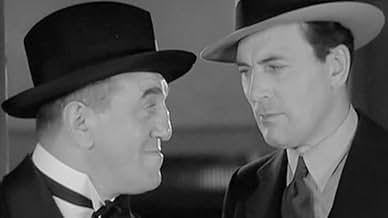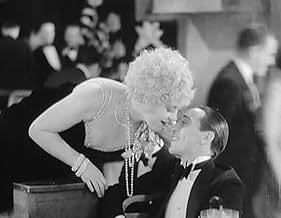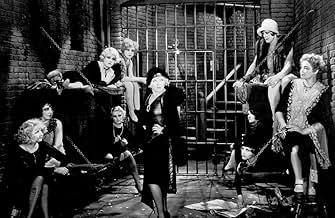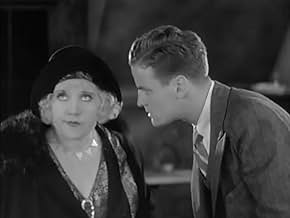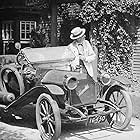IMDb RATING
6.6/10
1.7K
YOUR RATING
An honest police captain vows to bring down a powerful bootlegger who is protected by corrupt politicians and judges.An honest police captain vows to bring down a powerful bootlegger who is protected by corrupt politicians and judges.An honest police captain vows to bring down a powerful bootlegger who is protected by corrupt politicians and judges.
- Nominated for 1 Oscar
- 3 wins & 1 nomination total
G. Pat Collins
- Patrolman Johnson
- (as Pat Collins)
George E. Stone
- Joe Scarsi
- (as George Stone)
Sam De Grasse
- District Attorney Welch
- (as Sam DeGrasse)
Richard 'Skeets' Gallagher
- Miller
- (as Skeets Gallagher)
Frank Austin
- Man at Funeral
- (uncredited)
Jimmy Dime
- Rival Gang Lookout
- (uncredited)
Jim Farley
- Detective
- (uncredited)
Sherry Hall
- Orchestra Leader
- (uncredited)
Sydney Jarvis
- Bartender
- (uncredited)
Featured reviews
This has been resurrected courtesy of Turner Classic Movies, the University of Nevada, et al. (in pretty good shape, too) in a nicely done digital restoration, complete with a good score. If you get a chance to see it, you might want to take a chance: in spite of it being a silent (I consider that a handicap), it's an entertaining film, with a lot to like.
There's fine acting, especially by Louis Wolheim as the main gangster, whose face is so expressive you don't miss the sound as long as he's on screen. Marie Prevost and 'Skeets' Gallagher turn in solid supporting performances. There's clever dialogue: very good given the constraints silent films inherently have.
Personally, I thought the best feature is the wonderful cinematography. Rarely does the camera technique look dated or technically primitive, and many scenes are as well done as any since. The use of dissolves and interesting angles was delightful, and there are even a couple (surprising, to me) attempts at zooms that come off alright. Obviously a good director/cinematographer team. The overall look of the film is fresh and clear.
The story is pretty entertaining and the characters are brought to life, making me glad this film was brought back to life as well.
There's fine acting, especially by Louis Wolheim as the main gangster, whose face is so expressive you don't miss the sound as long as he's on screen. Marie Prevost and 'Skeets' Gallagher turn in solid supporting performances. There's clever dialogue: very good given the constraints silent films inherently have.
Personally, I thought the best feature is the wonderful cinematography. Rarely does the camera technique look dated or technically primitive, and many scenes are as well done as any since. The use of dissolves and interesting angles was delightful, and there are even a couple (surprising, to me) attempts at zooms that come off alright. Obviously a good director/cinematographer team. The overall look of the film is fresh and clear.
The story is pretty entertaining and the characters are brought to life, making me glad this film was brought back to life as well.
Like TWO ARABIAN KNIGHTS and THE MATING CALL, this film has now been restored by UNLV (which found the prints of these films once thought lost in an archive of producer Howard Hughes' possessions) in cooperation with Flicker Alley.
Lewis Milestone, who had just directed TWO ARABIAN KNIGHTS for Hughes, brought much of the same sense of friendly rivalry between the two leads to this picture, as well as the same co-star, Louis Wolheim. All the elements of many a subsequent gangster picture are here: The close personal relationship between the antagonists (gang boss Wolheim and cop Thomas Meighan); the kid brother whom the gangster wants to shelter from the rackets (George E. Stone, soon to appear in LITTLE CAESAR and many another gangster flick), but who runs afoul of a tough little chanteuse (Marie Prevost). Mob bosses cavorting in lavish nightclubs, overwrought gangland funerals, crooked politicians, a wet-behind-the-ears reporter with two old pros as a chorus: it's all here.
Enough of the action takes place in a run-down precinct house to belie the story's stage origins, but there's plenty of action, including a shootout between two rival gangs, to keep things hopping.
Lewis Milestone, who had just directed TWO ARABIAN KNIGHTS for Hughes, brought much of the same sense of friendly rivalry between the two leads to this picture, as well as the same co-star, Louis Wolheim. All the elements of many a subsequent gangster picture are here: The close personal relationship between the antagonists (gang boss Wolheim and cop Thomas Meighan); the kid brother whom the gangster wants to shelter from the rackets (George E. Stone, soon to appear in LITTLE CAESAR and many another gangster flick), but who runs afoul of a tough little chanteuse (Marie Prevost). Mob bosses cavorting in lavish nightclubs, overwrought gangland funerals, crooked politicians, a wet-behind-the-ears reporter with two old pros as a chorus: it's all here.
Enough of the action takes place in a run-down precinct house to belie the story's stage origins, but there's plenty of action, including a shootout between two rival gangs, to keep things hopping.
Sadly this film was made available long years (like 50) after the giants of the early gangster films were available---Little Cesear and The Public Enemy,so it missed the true acclaim it probably deserves.
Being made during Prohibition, and during the less "glamourous" studio period (but with an excellent director, fast paced script and great supporting cast) it has the immediate feel of the time---when the policeman hero is exiled to the country it IS the country, and the character actors shine here--especially the incandescent and tragic Marie Prevost as the platinum blonde chanteuse, Helen Hayes. She is absolutely wonderful as a complete jazz baby flinging herself into the arms of the nearest well heeled heel available, her desperation clearly visible under the surface. This performance is subtle in it's (Mae West) undertones, but she anticipates the bright gaudy generous hearted vulgarity of Jean Harlow by several years. She has a huge range with her hideous fox fur collared cape, her cigarette, and her bits of business with her props--she has the stage presence of her character's name Helen Hayes, but she is much more naughty and fun to watch. She cynically analyzes the lead villain's fear of women, and stands up to him, leveraging his fear in the face of his men, and lays her neck on the line. At the same time, she desperately digs for gold, playing hard to get with the gangster's weak spot, his younger, ratty brother. (George Stone in an early role). The scene where she rips off her "act" costume, and jumps on an upright piano and has the musician's wheel her over to the gangster's brother's "birthday party" is pure gold.
How sad that she died so horribly in real life, but how wonderful that her performance is preserved here in all it's splendor! While Thomas Meighan is the same noble stiff as a board hero of DeMille's society matrons movies of the l920s he also shows range in a "good cop" role with a noir twist at the end, making this one of the first contemporary gangster movies. George E Stone, who would go on to play everyone's favorite rat for the next 40 years is here in a juvenile lead, scummy and detestible as ever, and the perpetually bombed and wisecracking reporter Skeets Gallegar gets all the fast paced and best lines. God Bless Ted Turner for not letting this one get lost! Cannot wait for it to come out on DVD for all true noir and gangster film archaeologist's to enjoy! We can only wonder what a kick it would be in film histories of today if this had been available at the same time as The Public Enemy , Little Ceasar and other seminal works. If you are a "Merry Gangster Historian" go for it!
Being made during Prohibition, and during the less "glamourous" studio period (but with an excellent director, fast paced script and great supporting cast) it has the immediate feel of the time---when the policeman hero is exiled to the country it IS the country, and the character actors shine here--especially the incandescent and tragic Marie Prevost as the platinum blonde chanteuse, Helen Hayes. She is absolutely wonderful as a complete jazz baby flinging herself into the arms of the nearest well heeled heel available, her desperation clearly visible under the surface. This performance is subtle in it's (Mae West) undertones, but she anticipates the bright gaudy generous hearted vulgarity of Jean Harlow by several years. She has a huge range with her hideous fox fur collared cape, her cigarette, and her bits of business with her props--she has the stage presence of her character's name Helen Hayes, but she is much more naughty and fun to watch. She cynically analyzes the lead villain's fear of women, and stands up to him, leveraging his fear in the face of his men, and lays her neck on the line. At the same time, she desperately digs for gold, playing hard to get with the gangster's weak spot, his younger, ratty brother. (George Stone in an early role). The scene where she rips off her "act" costume, and jumps on an upright piano and has the musician's wheel her over to the gangster's brother's "birthday party" is pure gold.
How sad that she died so horribly in real life, but how wonderful that her performance is preserved here in all it's splendor! While Thomas Meighan is the same noble stiff as a board hero of DeMille's society matrons movies of the l920s he also shows range in a "good cop" role with a noir twist at the end, making this one of the first contemporary gangster movies. George E Stone, who would go on to play everyone's favorite rat for the next 40 years is here in a juvenile lead, scummy and detestible as ever, and the perpetually bombed and wisecracking reporter Skeets Gallegar gets all the fast paced and best lines. God Bless Ted Turner for not letting this one get lost! Cannot wait for it to come out on DVD for all true noir and gangster film archaeologist's to enjoy! We can only wonder what a kick it would be in film histories of today if this had been available at the same time as The Public Enemy , Little Ceasar and other seminal works. If you are a "Merry Gangster Historian" go for it!
If you've read some of my other comments, you'll know that I'm in the middle of watching all movies that received Academy Award nominations in the Academy's very first year, 1927-28. "The Racket" was one of three nominees for Best Picture, along with "Seventh Heaven" and "Wings," and though it's by far the least ambitious and "important" of the three, it's the one that I found to be most satisfying.
It's a quick, speedy little gangster thriller from Lewis Milestone about one committed cop's determination to see a crime lord brought to justice. It was based on a play, but Milestone does a terrific job of keeping things cinematic -- this movie moves, and that plus the fact that it's not long to begin with makes its running time go racing by.
Thomas Meighan, who apparently was a big name at the time but who is unfamiliar to me, plays the cop, while Louis Wolheim plays the gangster. Both are terrific, but both are upstaged, as is everyone else, by Marie Prevost (playing a character named, of all things, Helen Hayes) as surely one of the first memorable gangster molls. She gets a really good pre-Code line (if silent films can be said to have lines) about babies and storks that gives you one of those "could they really say things like that back then" moments that pre-Code movies always have.
As far as I know, this movie isn't available anywhere for legitimate viewing. I had to see it the same way I saw "Wings," by watching it in pieces on a site whose name I won't mention. Better catch it soon before someone takes it down.
Grade: A
It's a quick, speedy little gangster thriller from Lewis Milestone about one committed cop's determination to see a crime lord brought to justice. It was based on a play, but Milestone does a terrific job of keeping things cinematic -- this movie moves, and that plus the fact that it's not long to begin with makes its running time go racing by.
Thomas Meighan, who apparently was a big name at the time but who is unfamiliar to me, plays the cop, while Louis Wolheim plays the gangster. Both are terrific, but both are upstaged, as is everyone else, by Marie Prevost (playing a character named, of all things, Helen Hayes) as surely one of the first memorable gangster molls. She gets a really good pre-Code line (if silent films can be said to have lines) about babies and storks that gives you one of those "could they really say things like that back then" moments that pre-Code movies always have.
As far as I know, this movie isn't available anywhere for legitimate viewing. I had to see it the same way I saw "Wings," by watching it in pieces on a site whose name I won't mention. Better catch it soon before someone takes it down.
Grade: A
Lewis Milestone performed one of his best directing jobs with "The Racket." He had a superior cast in what, in a later talkie, might be just a mediocre script, but taken in context, "The Racket" is a great movie. Watch the byplay during the funeral, for example.
Milestone and his editors and special effects people create some excellent visual effects to complement a cast that charms even in the role of slimy bad guy. Minor characters still got their chances to shine in the spotlight and even the non-speaking -- well, of course all the characters were non-speaking in one sense -- the un-named characters whose job was to look menacing or even just interested in the goings-on, all stood out.
Frankly this film was a surprise to me -- not that it was so good, but that I had had no knowledge of it beforehand.
To come so early in the career of so many of the people connected with it, notably Howard Hughes, who had the (to me) strange title of "presenter," this film is a stand-out. Robert Israel, who wrote the music for this revival, is fast becoming one of the great composers of the modern era.
All the people who are responsible for this film's recent revival deserve the thanks of film lovers as well as film historians. "The Racket" is one to see again.
Milestone and his editors and special effects people create some excellent visual effects to complement a cast that charms even in the role of slimy bad guy. Minor characters still got their chances to shine in the spotlight and even the non-speaking -- well, of course all the characters were non-speaking in one sense -- the un-named characters whose job was to look menacing or even just interested in the goings-on, all stood out.
Frankly this film was a surprise to me -- not that it was so good, but that I had had no knowledge of it beforehand.
To come so early in the career of so many of the people connected with it, notably Howard Hughes, who had the (to me) strange title of "presenter," this film is a stand-out. Robert Israel, who wrote the music for this revival, is fast becoming one of the great composers of the modern era.
All the people who are responsible for this film's recent revival deserve the thanks of film lovers as well as film historians. "The Racket" is one to see again.
Storyline
Did you know
- TriviaOnly one copy of the film is known to have survived. It was long thought lost before being located in Howard Hughes' film collection after his death. The film was restored and preserved by the University of Nevada, Las Vegas film department. The restored copy is frequently shown on Turner Classic Movies in the US.
- GoofsMcQuigg's holster is embossed with his name and rank, but it also says CITY OF followed by a blank space.
- Quotes
Cub Reporter Ames: I told you not to look after me... Why did you do it?
Helen Hayes: Because - -- because you affect me like a mammy song.
- Alternate versionsIn 2004, The University of Nevada, Las Vegas and Flicker Alley, LLC copyrighted a new digital version with a new orchestral score composed, arranged and conducted by Robert Israel. It was produced by Jeffery Masino and runs 84 minutes.
- ConnectionsReferenced in Public Enemies: The Golden Age of the Gangster Film (2008)
- How long is The Racket?Powered by Alexa
Details
- Runtime1 hour 24 minutes
- Color
- Sound mix
- Aspect ratio
- 1.33 : 1
Contribute to this page
Suggest an edit or add missing content


